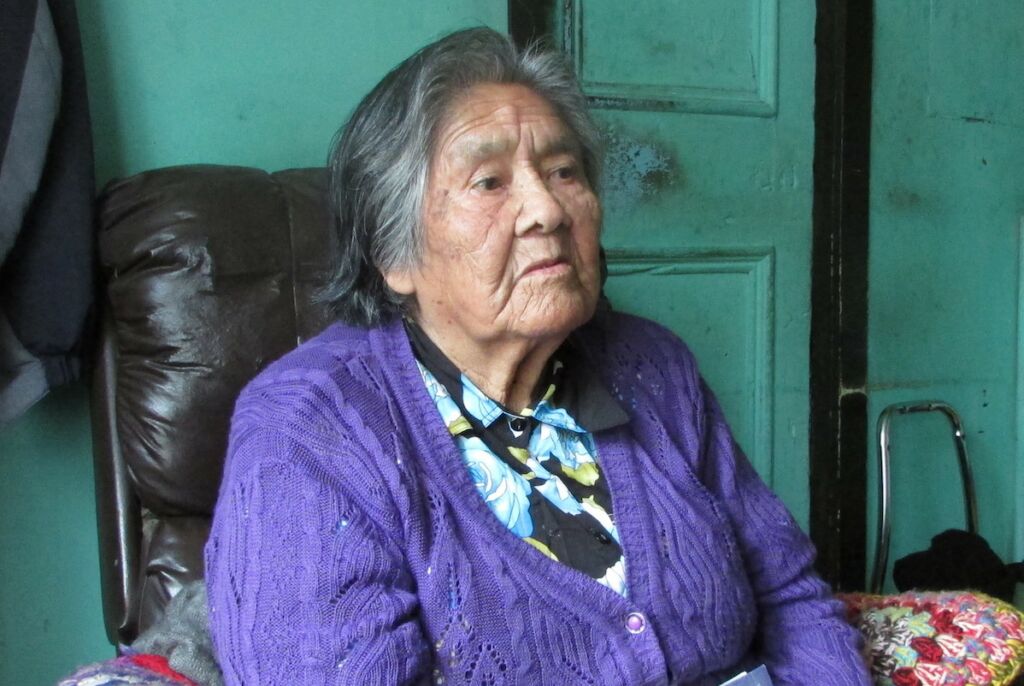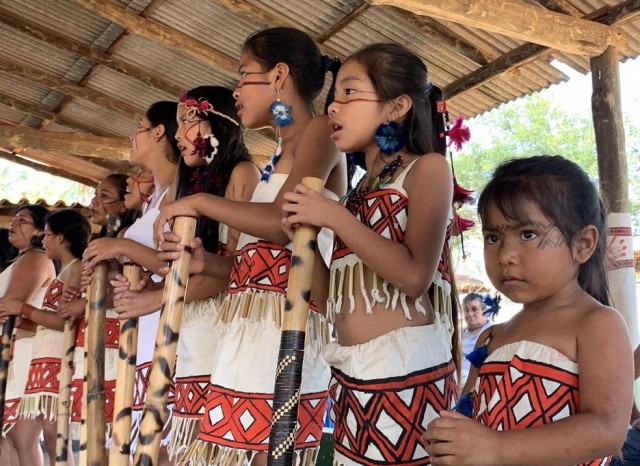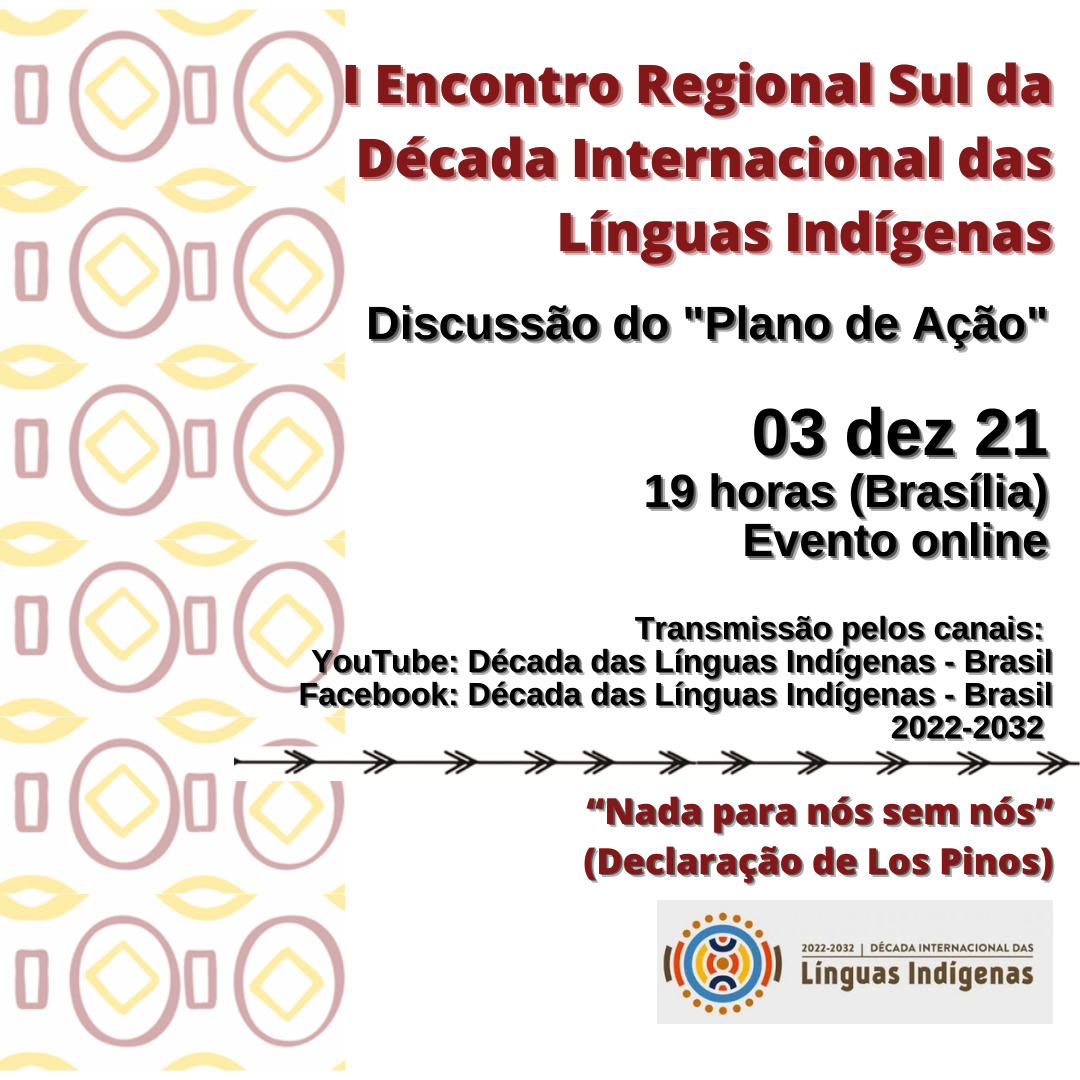Cristina Calderón, última falante da lingua Yagán, morre no Chile aos 93 anos
Considerada um Tesouro Vivo da Humanidade pela UNESCO, ela leva consigo as vozes dos canoístas indígenas da Terra do Fogo

Wikipédia
Antes de morrer, Cristina ainda trabalhou com na criação de um dicionário que traduz a língua para espanhol, havendo assim ainda uma esperança de preservação da cultura.
Com a morte da última guardiã desta relíquia cultural, a língua indígena Yamana, na América do Sul, perdeu agora todos os seus falantes. Cristina Calderón, que dominava a língua Yamana da comunidade Yagan, morreu na quarta-feira, aos 93 anos.
Depois da morte da sua irmã em 2003, Cristina era a última pessoa no mundo que sabia falar a língua. Mas nem tudo está perdido com a sua morte, já que a idosa chilena trabalhou na criação de um dicionário da língua com traduções para o Espanhol antes da sua morte, revela o The Guardian.
“Com ela, uma parte importante da memória cultural do nosso povo desaparece”, escreveu Lidia González, filha de Cristina, no Twitter, que acredita que, no entanto, o dicionário traz alguma esperança de que a língua não morra com a sua última falante.
Lidia é também uma das representantes que está atualmente a trabalhar na redação de uma nova Constituição no Chile.
“Apesar de com a sua morte, uma riqueza de, especialmente, conhecimento empírico seja perdido em termos linguísticos, a possibilidade de se resgatar e sistematizar a língua continua aberta”, acrescenta.
Apesar de ainda haver alguns membros da comunidade Yagan vivos, ao longo das gerações, as pessoas progressivamente deixaram de falar e aprender a língua, que é considerada “isolada” devido à dificuldade de se determinar a origem das suas palavras.
Calderón vivia numa casa simples e ganhava a vida a vender meias tricotadas na vila chilena de Villa Ukika, criada pelos Yagan nos arredores de Puerto Williams.
O grupo indígena ancestral costumava viver nos arquipélagos no extremo sul da América Latina, que pertencem agora ao Chile e à Argentina, numa zona próxima da Antártida.
Extinção de línguas indígenas pode aniquilar saberes sobre plantas medicinais, diz estudo

Estudo da Universidade de Zurique, na Suíça, mostra que grande parte do conhecimento sobre plantas medicinais está atrelado a línguas indígenas ameaçadas
O estudo analisou três regiões (Amazônia, Nova Guiné e América do Norte). Nele, os pesquisadores Jordi Bascompte, do Departamento de Biologia Evolutiva e Estudos Ambientais da Universidade de Zurique e Rodrigo Cámara-Leret, especialista em biodiversidade concluíram que 75% dos usos de plantas medicinais são conhecidos em apenas uma língua.
No noroeste da Amazônia, o estudo avaliou 645 espécies de plantas e seus usos medicinais conforme a tradição oral de 37 línguas, e detectou que 91% desse conhecimento só existe em apenas um idioma; sua extinção implica também a morte desse saber medicinal.

No Brasil, escolas indígenas desempenham papel importante na preservação das línguas, assim como iniciativas de catalogação e revitalização, como ocorreu entre os Karitiana de Rondônia e os Pataxó da Bahia e Minas Gerais.
O projeto Ethnologue avalia que 42% das mais de 7 mil línguas existentes no mundo estejam ameaçadas de extinção. No Brasil, são 99 os idiomas que estão morrendo, sem contar aqueles que já desapareceram. Segundo o Instituto Socioambiental, das mil línguas indígenas faladas em território brasileiro antes da chegada dos portugueses, apenas 160 ainda estão vivas.
Bascompte e Leret alertam para o fato de que a extinção de línguas indígenas levará consigo conhecimentos tradicionais sobre plantas medicinais e isso poderá diminuir as chances de descoberta de futuros medicamentos.
Diversos medicamentos hoje comercializados em larga escala no mundo são elaborados a partir de plantas medicinais. Eles vão desde o ácido acetilsalicílico, conhecido popularmente como aspirina, com seu princípio ativo extraído do salgueiro (Salix alba L.) até a morfina, extraída da papoula (Papaver somniferum).
O estudo ainda concluiu que a perda das línguas terá maior impacto na extinção do conhecimento medicinal do que a perda da biodiversidade.
PARA LER A NOTÍCIA NA ÍNTEGRA, ACESSE MONGABAY
Expressões indígenas: Conheça algumas variações linguísticas na comunicação
Atualmente, no Brasil, existem 154 línguas indígenas. Calcula-se que 80% dos idiomas falados no país desapareceram de 1.500 até hoje
A chegada dos portugueses no Brasil e a posterior colonização do território proporcionou uma drástica mudança no modo de viver nos nativos que habitavam a região. Costumes, roupas, religião e até mesmo o modo de falar. Estima-se que antes da chegada dos portugueses, havia entre 600 e mil línguas sendo faladas pelos nativos indígenas.
Essas e outras informações fazem parte de uma extensa pesquisa que resultou no livro ‘Não Fala Só Tupi’, dos linguistas Bruna Franchetto e Kristina Balykova. Entre as informações sobre as pouco mais de 150 línguas indígenas faladas no Brasil atualmente, está a forma como a maioria possui e adapta expressões de acordo com a região

A exemplo da língua portuguesa, que é falada em dez países ao redor do globo, a língua indígena apresenta mudanças decorrente de fatores históricos e culturais. O português que se fala no Brasil não é o mesmo que se fala em Portugal, ou na Angola, ou Timor-Leste, o que não faz com que sejam línguas diferentes, apenas possuem dinâmicas linguísticas distintas. O mesmo acontece na língua inglesa, nos Estados Unidos e na Inglaterra.
As 154 línguas indígenas existentes no território brasileiro são agrupadas em famílias. Algumas delas podem ser formadas por subfamílias, pequenas ou grandes. No estado do Pará, são faladas 34 línguas indígenas. Destas, 18 são tupi; nove são da família Karib; cinco línguas Macro-Jê; uma língua da família Aruak e uma da Warao.
A exemplo da língua portuguesa, que é falada em dez países ao redor do globo, a língua indígena apresenta mudanças decorrente de fatores históricos e culturais. O português que se fala no Brasil não é o mesmo que se fala em Portugal, ou na Angola, ou Timor-Leste, o que não faz com que sejam línguas diferentes, apenas possuem dinâmicas linguísticas distintas. O mesmo acontece na língua inglesa, nos Estados Unidos e na Inglaterra.
As 154 línguas indígenas existentes no território brasileiro são agrupadas em famílias. Algumas delas podem ser formadas por subfamílias, pequenas ou grandes. No estado do Pará, são faladas 34 línguas indígenas. Destas, 18 são tupi; nove são da família Karib; cinco línguas Macro-Jê; uma língua da família Aruak e uma da Warao.

Foto: Nicolle Januzzi/Arquivo Pessoal
I Encontro Regional Sul da Década das Línguas Indígenas no Brasil
Horário do encontro: 19h (horário de Brasília).
Em breve, divulgaremos o link da sala online (Meet Google).
Link para leitura do Plano de Ação AQUI
Venha conhecer o Mapa Interativo das Línguas Indígenas do estado do Pará!
Neste mapa, clicando no nome das línguas indígenas, você entra nas terras e nos territórios indígenas do estado do Pará.
Aqui, você pode conhecer um pouco sobre as 34 línguas indígenas faladas no estado do Pará: quais povos falam essas línguas, onde elas se localizam, a que família ou tronco linguístico elas pertencem. Como todos os territórios indígenas se localizam às margens dos rios, também disponibilizamos os nomes dos rios que banham estes territórios.
Financiado pelo Edital de Cultura Imaterial da Lei Aldir Blanc – FIDESA – SECULT – Secretaria Especial de Cultura – Ministério do Turismo.
Acesse o Mapa Interativo das Línguas Indígenas do estado do Pará AQUI
Documentário “Entre rios e palavras: as línguas indígenas no Pará em 2021”
Este documentário apresenta um panorama das línguas indígenas faladas no Estado do Pará em 2021. Pesquisadores indígenas e não-indígenas debatem sobre os processos históricos de silenciamento e de resistência que envolvem o governo das línguas na região e no Brasil. Nesta abordagem, a língua é tomada não apenas como uma estrutura linguística, mas sim como uma prática cultural fundamental para as cosmologias indígenas, compreendida como a tradução de suas alegrias, de suas dores e de suas transformações históricas.
Muito antes da colonização, as sociedades indígenas já se organizavam pelos leitos dos rios da Amazônia e eles representavam os espaços privilegiados por onde circulavam as línguas indígenas. Hoje, continuam espraiadas pelos rios da região, se apropriando e ao mesmo tempo estabelecendo estratégias de defesa em relação às palavras estrangeiras, que para cá trouxeram novas formas de vida e de morte.
Assista no canal no YOUTUBE do GEDAI – Grupo de Estudo Mediações, Discursos e Sociedades Amazônicas



